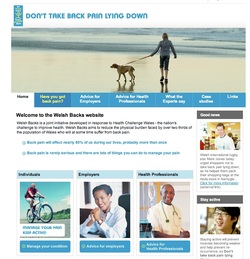|
I was intrigued to see a campaign launched in Wales to help with treatment of acute low back pain. Or perhaps the word should be management rather than treatment as they don't seem to mention any treatment for folks who have acute low back pain at all. Quite correctly they (and they are "a joint initiative developed in response to Health Challenge Wales") point out that the medicalisation of back pain is a bad thing and therefore "treatment' can be unhelpful in the resolution of the back pain symptoms. Quite correctly they talk about keeping active, keeping positive and understanding that pain does not equal damage. There is even a section on better breathing. There is some helpful advice for both patients and GPs alike about the likely outcomes and what is useful in terms of diagnosis. The glaring omission from this worthy initiative is that there is a place for manual therapy and spinal manipulation in the management of acute back pain. People with back pain need advice and some demystification of the problems associated with back pain sure enough but many of them would also benefit from manipulation or acupuncture/dry needling. The only mention of spinal manipulation is in a short piece by Jonathan Pryce, the actor, who says that he seeks the care of a qualified chiropractor when he has pain. Sensible chap. The NICE guidelines for nonspecific back pain mention keeping active, manual therapy and acupuncture. I would have thought that the website ought at least give a little advice about how to seek help and who from and what to expect. I hope the good folk of Wales are happy doing breathing exercises when their backs are killing them. I, for one, would rather see my local quack.
0 Comments
I often tell some of my more anxious back pain patients that "backs get better". And for the most part this is perfectly true; of course there are people for whom back pain will be ever present and for these people we can only have the greatest sympathy. Long term pain of any kind is a truly awful thing.
Even so, for many, backs do get better and this little nugget of information is often a complete surprise. Back pain is so incredibly common that should I grab the first 100 adults emerging from my local Tescos, 20 of them would be suffering low back pain at that very moment. How many of them would be sneezing with a common cold? It is estimated that over 60% of us have at least one major episode of back pain at some stage during our lives. If we look at it in the light of all this suffering it is self evident that most back trouble does resolve or the majority would be bent double for most of the time. But perhaps we should be a little more cautious. Patients do not continue to consult their GP, Chiropractor, Physio etc if they feel that the problem has not resolved despite treatment. A study for the BMJ by Croft et al in 1998 about the outcome of GP management for low back pain concluded that, "The results are consistent with the interpretation that 90% of patients with low back pain in primary care will have stopped consulting with symptoms within three months. However most will still be experiencing low back pain and related disability one year after consultation." Many appear to just simply put up with the discomfort and alter their lives to accommodate it, disillusioned with the care they have received and not confident to seek any more until perhaps their problems are intractable and they become a self fulfilling prophesy. Maybe then it is not that backs get better - perhaps it is patients who simply stay away. |
AuthorKeith Walker is a chiropractor and manual therapist . He provides evidenced based care for his patients in Plymouth, Devon. Archives
November 2010
Categories
All
www.chiropractorslocally.co.uk- We are listed on Chiropractors locally
|

 RSS Feed
RSS Feed
